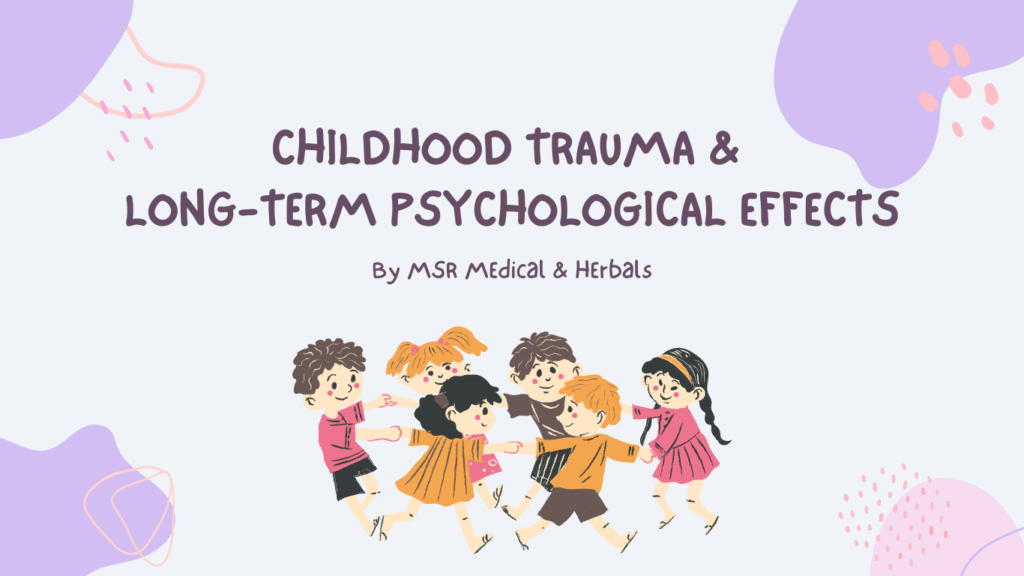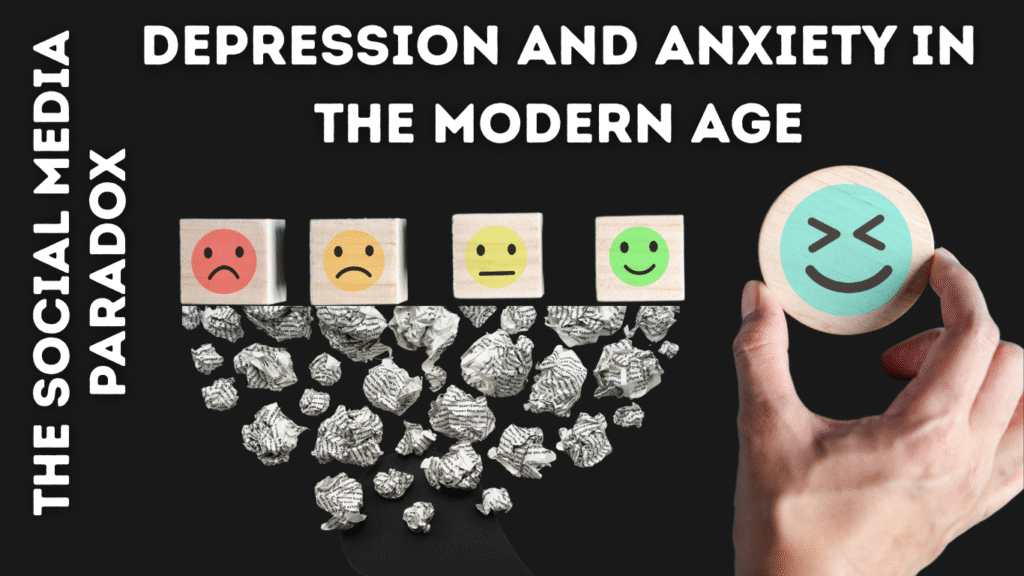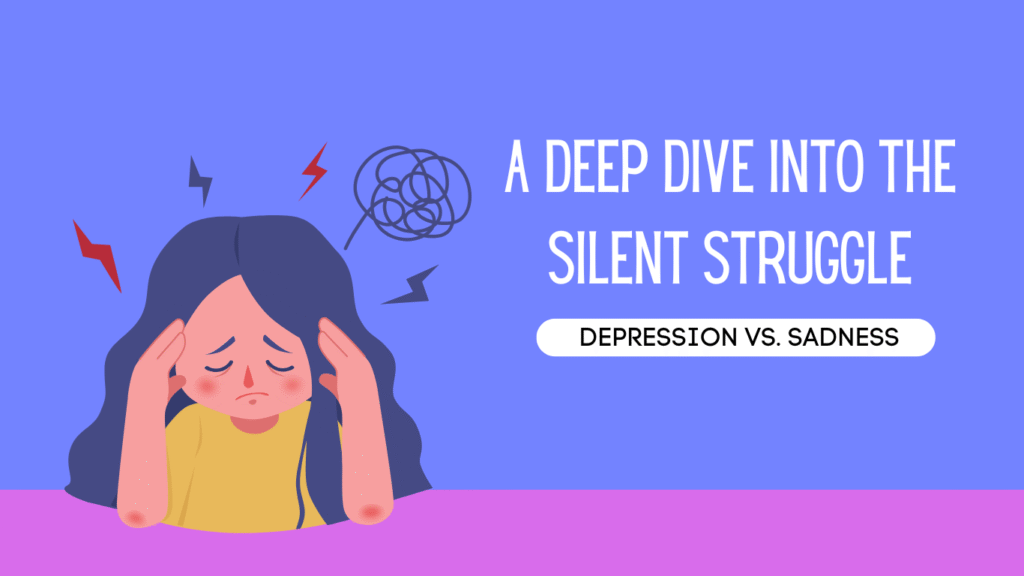Understanding Childhood Psychological Trauma
What is Childhood Trauma?
Childhood psychological trauma is not always about visible wounds or extreme cases of abuse. It can come from emotional neglect, bullying, a chaotic home, witnessing violence, or even ongoing criticism and rejection.
Trauma occurs when a child’s sense of safety is threatened—physically or emotionally—and they don’t have the tools or support to cope. In these moments, their developing brain doesn’t process the pain fully. Instead, it stores it, often unconsciously, and that pain can resurface years or even decades later.
This kind of trauma isn’t “just a bad memory.” It becomes a filter through which a child sees the world, forming beliefs like:
“I’m not safe.”
“I’m not lovable.”
“People can’t be trusted.”
This is where childhood trauma psychology begins—because these early beliefs often shape adult behavior, relationships, and self-worth.
Types of Childhood Trauma
There are several forms of childhood psychological trauma, and each can have a unique impact:
Physical abuse: Inflicts pain, but also teaches fear and hyper-vigilance.
Emotional abuse: Constant criticism, humiliation, or rejection that affects self-esteem.
Neglect: Lack of emotional or physical care, leading to feelings of worthlessness or abandonment.
Sexual abuse: Causes deep emotional scars and long-term trust issues.
Household dysfunction: Living with addiction, mental illness, or domestic violence creates chronic stress and anxiety.
Even so-called “milder” experiences—like growing up with emotionally distant parents or experiencing a traumatic divorce—can deeply affect a child’s psychological development.
Childhood Trauma Psychology – What Happens in the Brain
The brain of a traumatized child is wired for survival, not connection. When a child is in a constant state of fear, the brain’s amygdala becomes overactive, always scanning for danger. The prefrontal cortex—responsible for reasoning and impulse control—often underdevelops as a result.
This leads to:
Heightened emotional reactivity
Trouble regulating emotions
Difficulty trusting others
Increased risk of mental illness
This is the neuroscience of childhood trauma psychology—and it explains why healing isn’t about “just getting over it.” It’s about rewiring the brain and rewriting the story.
Psychological Effects of Childhood Trauma
Emotional and Behavioral Consequences
The psychological effects of childhood trauma don’t disappear when a child grows up. They often show up in adult life as:
Fear of abandonment
People-pleasing or codependency
Chronic anxiety or depression
Difficulty regulating emotions
Self-sabotaging behaviors
These effects aren’t random—they’re protective mechanisms the child developed to survive. But in adulthood, these same patterns can become harmful and limiting.
Understanding that your reactions are rooted in trauma—not weakness—is a powerful step toward healing.
Mental Health Disorders Linked to Early Trauma
Childhood trauma psychological effects are strongly linked to various mental health conditions later in life, including:
PTSD (Post-Traumatic Stress Disorder)
Generalized Anxiety Disorder
Major Depression
Borderline Personality Disorder
Substance Use Disorders
Eating Disorders
These aren’t separate issues—they are often symptoms of unresolved trauma.
This is why asking, “How does childhood trauma affect psychological problems later in life?” is so important. Because the answer could unlock better, more compassionate treatment approaches.
Childhood Trauma Psychological Effects Across the Lifespan
Without healing, the pain of the past becomes the lens through which adulthood is experienced.
In relationships: Fear of intimacy, emotional walls, or staying in toxic dynamics.
In careers: Imposter syndrome, perfectionism, fear of failure or success.
In health: Chronic pain, autoimmune conditions, insomnia, and more.
The truth is, childhood trauma psychological effects are long-lasting—but they are also reversible with the right support.
How Childhood Trauma Affects Adulthood Psychology
How Does Childhood Trauma Affect Adulthood Psychology?
You don’t just “grow out of” trauma. If it’s not addressed, it follows you. Many adults who experienced childhood psychological trauma find themselves reacting to present-day stress with overwhelming fear, shame, or emotional shutdown—because the past is still running the show.
So, how does childhood trauma affect adulthood psychology? It shapes your core beliefs about yourself and the world:
“I’m unworthy of love.”
“I have to be perfect to be accepted.”
“People always leave.”
These internal messages lead to anxious attachments, difficulty trusting, and chronic self-doubt. Adult challenges like addiction, anger issues, or even workaholism are often trauma responses in disguise.
Recognizing the connection between your adult struggles and your childhood experiences is the beginning of transformation.
Relationship Issues and Trust Problems
One of the most visible areas where trauma shows up? Relationships.
People with unresolved childhood trauma psychological effects often struggle with:
Fear of rejection or abandonment
Difficulty expressing needs or setting boundaries
Attracting emotionally unavailable or abusive partners
Sabotaging healthy relationships out of fear
Why? Because their nervous system is wired to expect hurt, not love. Trauma survivors often confuse chaos with chemistry and calm with boredom—making it hard to build safe, stable relationships.
Learning how to regulate emotions, communicate openly, and trust again requires intentional healing.
Self-Esteem and Identity Struggles
If a child grows up in an environment where they’re constantly invalidated, ignored, or criticized, they internalize that as truth. As adults, they struggle with low self-worth and identity confusion.
They ask themselves:
“Who am I without trying to please others?”
“Do I even deserve happiness?”
“Why do I feel like I’m never enough?”
This is the deep cost of childhood trauma psychology—it doesn’t just hurt your feelings. It reshapes your entire sense of self.
The Link Between Childhood Trauma and Later Psychological Problems
How Does Childhood Trauma Affect Psychological Problems Later in Life?
Research shows that individuals with childhood trauma are significantly more likely to develop mental health issues in adulthood. This includes depression, anxiety, substance abuse, and even suicidal ideation.
The Adverse Childhood Experiences (ACEs) study proved that the more traumatic experiences a child has, the higher their risk for:
Chronic illnesses
Mental health disorders
Emotional dysregulation
Risky behaviors
So, how does childhood trauma affect psychological problems later in life? It lays the groundwork for emotional instability and coping mechanisms that aren’t sustainable.
But again, awareness = power. You’re not “broken”—you’re responding in a very normal way to abnormal past events.
PTSD, Anxiety, and Depression as Long-Term Outcomes
PTSD isn’t just for war veterans. Children who experience abuse, neglect, or extreme instability can also develop complex PTSD—a condition marked by:
Flashbacks or emotional replays of traumatic events
Hyper-vigilance or extreme alertness
Emotional numbness or detachment
Difficulty concentrating or trusting others
Anxiety often stems from unpredictable environments in childhood. If your caregivers were unstable, you learned to live on edge.
Depression can stem from unexpressed grief, unmet needs, or a deep sense of shame rooted in early experiences.
Understanding these links helps us stop blaming ourselves and start addressing the real cause: unresolved pain.
The Body Remembers – Trauma’s Impact on Physical Health
Trauma isn’t just stored in your mind—it lives in your body.
Dr. Bessel van der Kolk’s groundbreaking book, The Body Keeps the Score, revealed how unprocessed trauma manifests as:
Chronic fatigue
Autoimmune conditions
Digestive issues
Muscle tension
Unexplained pain
The body remembers what the mind tries to forget. That’s why healing has to be holistic—addressing both the psychological and physical toll of trauma.
How to Heal: Psychological Recovery from Childhood Trauma
How Can I Psychologically Recover from Childhood Trauma?
Healing from childhood psychological trauma isn’t easy—but it’s absolutely possible. It starts by acknowledging that the trauma happened and that it matters.
Steps toward recovery:
Recognize the trauma and its effects
Stop blaming yourself
Seek therapy (especially trauma-informed)
Relearn safe relationships
Practice self-care and emotional regulation
So, when you ask, how can I psychologically recover from childhood trauma?—know this: it begins the moment you decide your past doesn’t get to define your future anymore.
The Role of Therapy and Professional Help
Therapy is one of the most powerful tools for healing trauma. Here’s why:
It gives you a safe space to process pain
It helps reframe toxic beliefs
It teaches coping tools and emotional regulation
Recommended therapies for trauma:
EMDR (Eye Movement Desensitization and Reprocessing)
CBT (Cognitive Behavioral Therapy)
Somatic therapy
IFS (Internal Family Systems)
Therapists trained in childhood trauma psychology understand how deep these wounds go—and how to help you walk through them.
Daily Habits That Support Healing
Beyond therapy, daily practices can support your healing:
Journaling: Release emotions and track progress
Mindfulness: Stay grounded in the present
Movement: Yoga, walking, or dance to reconnect with your body
Rest: Prioritize sleep and relaxation
Connection: Surround yourself with people who feel safe
Healing is not linear. Some days will feel heavy—but each step you take is a victory.
How to Get Rid of My Childhood Psychological Trauma
Rewriting Your Narrative
When people ask, “How to get rid of my childhood psychological trauma?” the goal isn’t to erase the past—it’s to rewrite how it lives in your present.
One of the most powerful healing tools is narrative therapy—changing the story you tell yourself:
From “I was never good enough” to “I survived something incredibly hard.”
From “I can’t trust anyone” to “I’m learning to trust the right people.”
From “It was my fault” to “I was a child, doing the best I could.”
Rewriting your trauma narrative gives you agency. It allows you to stop living as a victim of your past and start thriving as the author of your future.
Inner Child Work and Emotional Release
The wounded child in you didn’t just vanish with age. They’re still there—hoping to be seen, heard, and loved. Inner child work involves connecting with that version of yourself and offering the comfort you never received.
Ways to begin:
Write a letter to your younger self
Visualize giving them a hug or kind words
Keep a childhood photo near your journal as a reminder
Speak affirmations to your inner child (e.g., “You are safe now.”)
True healing means feeling the feelings you were once too young to process. Cry. Scream into a pillow. Dance it out. Trauma doesn’t leave through logic—it leaves through expression.
Building a Future Beyond Trauma
Healing is more than surviving—it’s about building something beautiful.
To fully release childhood psychological trauma, create a future where you feel:
Emotionally safe
Empowered
Supported
Respected
Set goals that align with who you are becoming, not who you were forced to be. Choose relationships that reflect your healing. Develop boundaries that honor your needs.
You are not defined by what happened to you—but by how you choose to rise from it.
The Science Behind Healing
Neuroplasticity and Emotional Rewiring
You’re not stuck. Thanks to neuroplasticity, the brain’s ability to reorganize and form new neural connections, even long-term trauma can be healed.
Therapeutic practices literally reshape the brain. With each meditation, each reframed thought, and each emotionally safe moment, you’re building new neural pathways—ones rooted in safety, calm, and connection.
This is the science behind how childhood trauma affects adulthood psychology—and also how recovery is possible. The brain that was wired for survival can be rewired for peace.
Mind-Body Approaches (Yoga, EMDR, Meditation)
Healing trauma isn’t just “talk therapy”—it’s also physical and emotional. Your body remembers. That’s why mind-body therapies are so effective:
Yoga helps you reconnect with and feel safe in your body.
EMDR rewires traumatic memories using guided eye movements.
Meditation calms the nervous system and builds emotional resilience.
Combining these approaches with therapy supercharges your healing and anchors you in the present instead of the past.
Hope Through Consistent Progress
Recovery doesn’t mean you never get triggered. It means the triggers don’t control you anymore. It’s waking up and choosing yourself—every day, even when it’s hard.
Celebrate small wins:
Getting through a day without anxiety
Speaking your truth in a difficult moment
Setting a healthy boundary
Each step proves to your nervous system: “We are safe now. We are healing.”
When to Seek Help
Recognizing Unhealed Trauma
Sometimes we don’t realize how deeply trauma is affecting us until life starts to feel unmanageable. Signs you may need support:
Recurring nightmares or flashbacks
Chronic anxiety or depression
Toxic relationship patterns
Emotional numbness or emotional explosions
Feeling stuck in survival mode
If you’re asking, “How can I psychologically recover from childhood trauma?” the answer often begins with reaching out.
Finding the Right Therapist or Program
Not all therapy is created equal. For trauma recovery, look for professionals who specialize in:
Childhood trauma
PTSD/C-PTSD
Somatic experiencing
EMDR
Inner child healing
Ask questions. Trust your gut. You deserve a space where you feel seen, safe, and supported.
Also, explore group therapy, retreats, or trauma-informed coaching—community can be incredibly healing.
You Are Not Alone – Support Resources
You’re not weak for needing help—you’re wise for seeking it.
Here are some resources to begin your healing journey:
National Child Traumatic Stress Network (NCTSN)
The Body Keeps the Score by Bessel van der Kolk
Therapy platforms like BetterHelp or Talkspace
Trauma recovery podcasts and YouTube channels
Journals and self-help workbooks on childhood trauma
No matter how dark it’s been, healing is always possible. You are not alone.
Breaking the Cycle for the Next Generation
Conscious Parenting and Trauma Awareness
One of the greatest gifts of healing is the ability to break generational patterns. Many adults who’ve experienced childhood psychological trauma become more intentional parents because they know what pain feels like—and they want better for their kids.
Conscious parenting means:
Apologizing when you mess up
Encouraging emotional expression
Validating feelings rather than minimizing them
Teaching kids that it’s okay to ask for help
When you heal yourself, you heal forward. You raise children who won’t need to recover from their childhoods.
Creating Emotionally Safe Spaces for Children
Children need more than food, shelter, and education. They need to feel emotionally safe.
That means:
Listening without judgment
Offering consistent affection and reassurance
Respecting their boundaries and individuality
Teaching them how to process and express emotions
When children feel emotionally secure, they’re more likely to grow into resilient, emotionally intelligent adults who don’t carry the burden of repressed trauma.
Teaching Kids to Name and Express Feelings
One of the simplest but most powerful tools for breaking the trauma cycle? Teaching emotional literacy.
Help kids name what they feel:
“You’re sad because your toy broke.”
“It’s okay to be mad when something feels unfair.”
“You’re nervous—do you want to talk about it?”
By naming feelings and modeling healthy emotional behavior, you give children the tools to handle life without storing pain like many of us did.
Conclusion
Childhood psychological trauma leaves invisible wounds that can shape a person’s identity, behavior, relationships, and emotional health. It’s not something we just “get over”—it’s something we must work through, with gentleness and courage.
But here’s the truth: your trauma is not your identity. It’s something that happened to you, not something you are.
If you’ve ever wondered:
How does childhood trauma affect adulthood psychology?
How can I psychologically recover from childhood trauma?
How do I get rid of my childhood psychological trauma?
Know that healing is possible. With the right tools, support, and belief in your worth, you can stop surviving and start thriving. You can create a life that feels safe, joyful, and free.
You are not alone. You are not broken. And you are more resilient than you know.
FAQs
1. Can childhood trauma cause lifelong psychological issues?
Yes. If left unaddressed, childhood trauma can lead to long-term psychological challenges like depression, anxiety, PTSD, and relationship difficulties. However, with support and healing, these effects can be significantly reduced or resolved.
2. How long does it take to heal from childhood trauma?
Healing is not a straight line and doesn’t follow a specific timeline. Some people experience major progress in months; others may work through it for years. The important thing is to keep moving forward at your own pace.
3. Is therapy necessary for recovery?
Therapy, especially trauma-informed therapy, is one of the most effective tools for recovery. That said, healing can also include self-help strategies, support groups, journaling, and mindfulness practices.
4. Can childhood trauma be completely resolved?
While you may never forget what happened, you can reach a place where it no longer controls your emotions, decisions, or relationships. Complete emotional freedom is absolutely possible.
5. What if I don’t remember my childhood trauma clearly?
It’s common to have fragmented or repressed memories. What matters most is how you feel now. If you’re experiencing anxiety, shame, or patterns that don’t make sense, exploring possible early trauma with a therapist can be incredibly healing.



